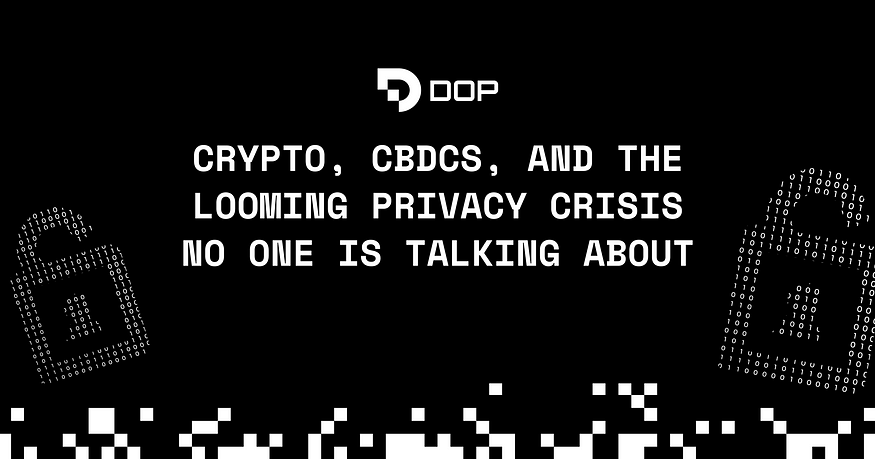DOP — Your Data. Your Choice
- Consumers worldwide have a legal right to privacy that’s coming under threat from central bank digital currencies. But cryptocurrencies are also failing to protect our anonymity, putting decades of hard-fought advances at risk.

The crypto space is fighting battles on many fronts right now, but there’s one issue that isn’t being given the attention it deserves: privacy.
Cryptocurrencies are often lazily described as a criminal’s dream — an easy way of moving illicit funds without getting caught. But the reality couldn’t be any more different. Every transaction on a blockchain is visible for the world to see, and it can be pretty easy to connect the dots.
Let’s take a step back and see how digital assets compare with traditional financial products. With cash, you can secretly hand a $20 bill to a friend without anyone knowing. Bank accounts keep your transactions private, with monthly statements that are for your eyes only. Crypto wallets, we hear you ask? Your total balance is out in the open — along with every payment you’ve ever sent and received.
No one’s disputing the transformative nature that Bitcoin and Ether have had. Both of these cryptocurrencies, and others, have finally allowed everyday consumers to take control of their financial affairs — and leave unstable fiat currencies behind. But looking at the industry today, it almost feels like we’ve taken two steps forward and three steps back. The gains made through disintermediating banks have been offset by unacceptable erosion to our privacy.
There are some in the industry who say this is a price worth paying. Transparency and openness are the way forward, they tell us, and making your transactions public shouldn’t be an issue if you’ve got nothing to hide. But this isn’t good enough — and law-abiding people don’t deserve to be tarred with the same brush as fraudsters and scammers.
Countries around the world have laws in place to protect unnecessary surveillance. In the US, the Right to Financial Privacy Act imposes strict checks and balances before government authorities can get their hands on someone’s financial records. Subpoenas need to be obtained before a bank can hand over information, customers have to be informed about what’s going on, and an appeals process must be followed. This ensures criminals are held to account, all while preventing abuse of power by federal agencies.
Such standards need to exist in the crypto industry. For too long, an “all or nothing” approach to privacy has deterred curious consumers from gaining exposure to digital assets — and has put those who own Bitcoin, Ether, altcoins and NFTs at serious risk. Accounts with substantial holdings can become a sitting target for hackers, and anyone in countries with limited freedom faces severe consequences if they make transactions that the authorities disapprove of.
All of this helps explain why Data Ownership Protocol is desperately needed. Crypto advocates continually talk about onboarding hundreds of millions of new users to the next generation of finance, without considering the limitations of existing infrastructure. Consumers will rightly expect an experience that doesn’t just match traditional finance — but betters it. DOP champions selective disclosure, meaning users can decide which data points they would like to keep private. Examples could include their account balance, past transactions, and the types of non-fungible tokens and cryptocurrencies they own.
This helps achieve the best of both worlds: retaining the confidentiality that TradFi users are accustomed to, while enabling them to experience the many benefits of decentralization — the true essence of crypto.
Our privacy deserves to be treated as a top priority in the crypto space — and developers everywhere need to remember it is a right afforded to consumers in dozens of countries. Hard-fought advances achieved over decades shouldn’t be lost overnight, and failing to act may mean we pass a point of no return. For an example of what this could mean in practice, let’s turn our attention to central bank digital currencies, a new innovation that’s gaining traction in major economies.




































